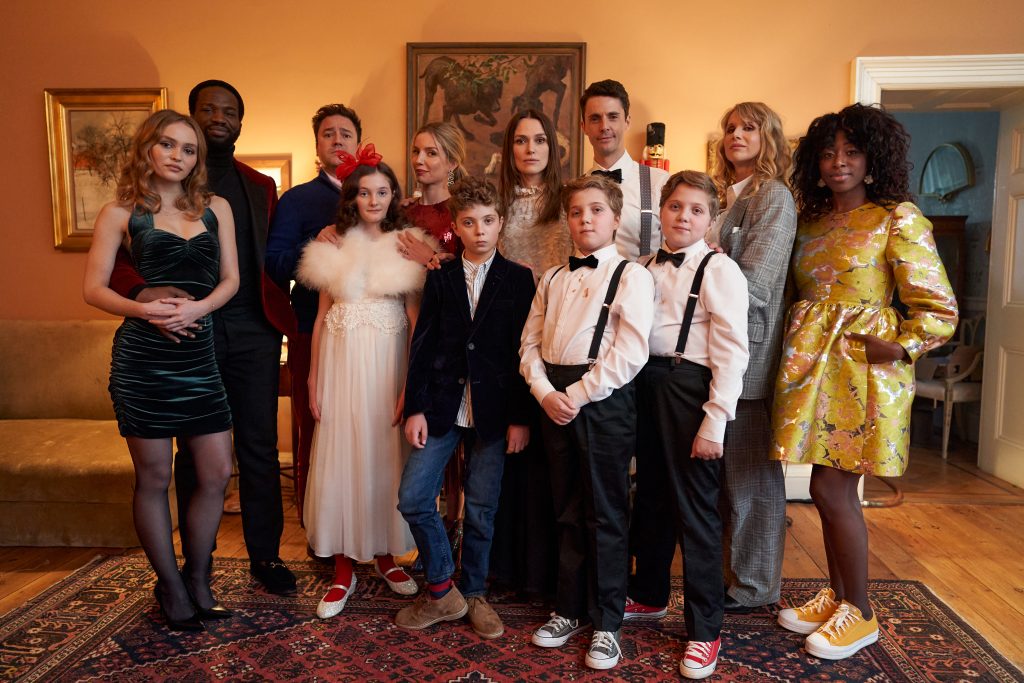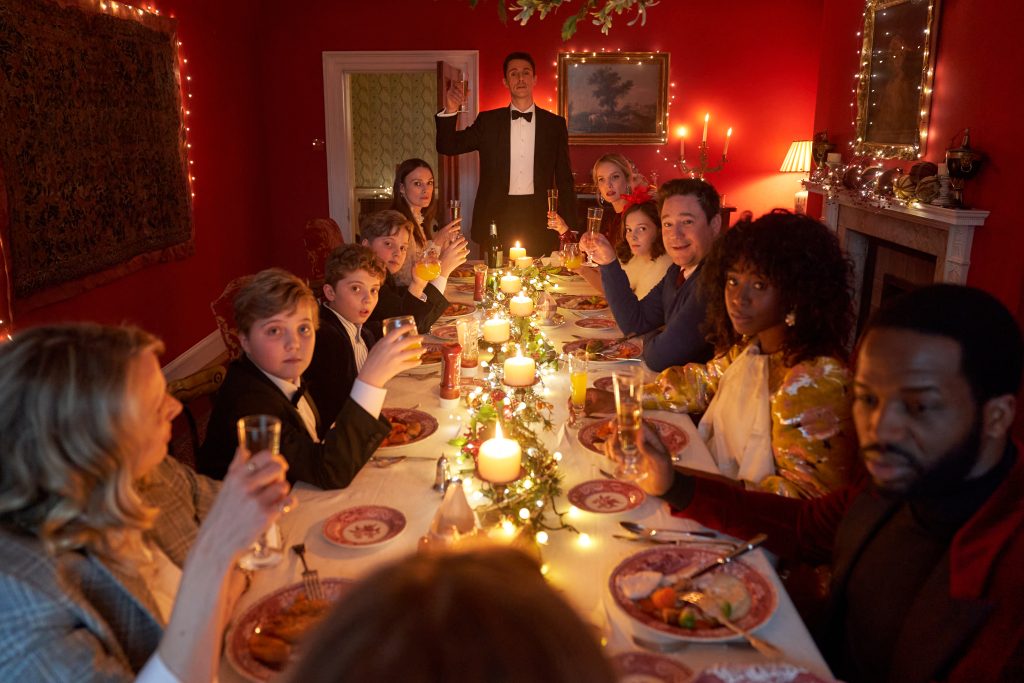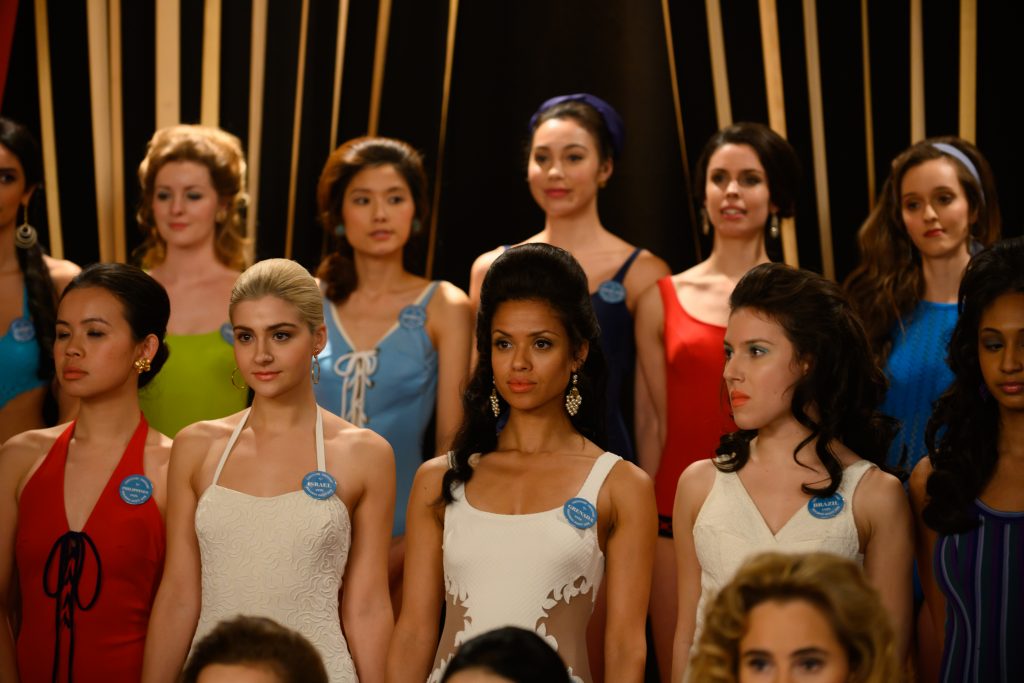December 24, 2021
by Carla Hay

Directed by Camille Griffin
Culture Representation: Taking place in an unnamed city in England, the dark comedy film “Silent Night” features a nearly all-white cast of characters (with two black people) representing the working-class and upper-middle-class.
Culture Clash: Before an impending apocalypse, a family gathers for one last Christmas dinner, where secrets are revealed, and there are emotionally painful debates over suicide.
Culture Audience: “Silent Night” will appeal primarily to people that are interested in watching very dark satires of how people deal with certain death.

“Silent Night” takes heartwarming movie clichés about Christmas holiday gatherings, and burns those stereotypes to a crisp. It’s not a horror film but a very dark comedy about how an apocalypse brings out the best and worst in people. Some viewers who have no problem watching apocalypse movies might have a problem with how the impending doom in “Silent Night” involves children and is set during the Christmas holiday season. Therefore, this movie is not for people who are very religious, or sensitive people who are extremely offended by debates about committing suicide versus waiting to be killed by an apocalypse.
“Silent Night” is the feature-film debut of writer/director Camille Smith, who took a bold risk to make her first feature film focused on such an uncomfortable topic and making it a satire. It’s a dialogue-heavy film about an upper-middle-class British family gathered for one last Christmas dinner on the eve of an apocalypse. There are secrets and lies that are revealed during this dinner, but this is not a typical apocalyptic movie where all the characters want to stay alive.
What makes “Silent Night” so different from other apocalyptic movies is that people in the movie have the option to take an Exit pill, which will kill them almost immediately, in order to avoid suffering during the apocalypse. It’s this suicide angle that’s the most likely to make “Silent Night” offensive or controversial to some viewers. However, the movie does point out the uncomfortable truth that tragedies such as suicide don’t stop just because of an impending apocalypse.
The movie is a disquieting roller coaster ride about how people’s minds can be messed with when dealing with the destructive end of the world as they know it. Some people want to plan ahead and be as prepared as possible. Some people want to deny it all and act like everything’s fine until the last possible moment. Some people don’t want to stick around for the apolocaypse to happen and want to take control of how and when they will die. Other people want to hold out hope that maybe they and their loved ones can survive the apocalypse.
This varied range of emotions and attitudes are all on display with the family gathered for this meal. Although there are many characters in the story, they have distinct personalities, so it’s easy to tell them apart. These family members are:
- Nell (played by Keira Knightley), a high-strung socialite who is determined to keep the annual holiday tradition of having a fabulous Christmas dinner at her home.
- Simon (played by Matthew Goode), Nell’s patient and loving husband, who is more willing to discuss the impending apocalypse than Nell is.
- Art (played by Roman Griffin Davis), Nell and Simon’s outspoken and foul-mouthed youngest child, who’s about 12 or 13 years old.
- Hardy (played by Hardy Griffin Davis) and Thomas (played by Gilby Griffin Davis), the identical twin sons of Nell and Simon. The twins, who are about 14 or 15 years old, are almost as bratty as their younger brother Art.
- Sandra (played by Annabelle Wallis), Nell’s materialistic and judgmental older sister.
- Tony (played by Rufus Jones), Sandra’s laid-back and often-henpecked husband.
- Kitty (played by Davida McKenzie), Sandra and Tony’s prim and proper daughter, who’s about 12 or 13 years old.
- Bella (played by Lucy Punch), Nell and Sandra’s irresponsible queer older sister, who is a single mother, but her child is not with her at this dinner.
- Alex (played by Kirby Howell-Baptiste), Bella’s girlfriend, who works as a bodyguard and is more sensible than Bella.
- James (as Ṣọpẹ́ Dìrísù), Alex’s younger brother, who is an oncologist in his early 30s.
- Sophie (played by Lily-Rose Deep), James’ American girlfriend, who’s about 10 years younger than James is.
At first, the gathering seems festive and full of cheer, as everyone avoids talking about the apocalypse in depth. However, not everyone wants to be at this party. An early scene in the movie shows that while Sophie and James were driving to Nell and Simon’s house, Sophie expresses her reluctance to go to the party this year. There’s definitely disagreeable tension between this couple. Eventually, the bickering and discord begin among other people at this gathering.
Sandra and Bella have a little argument because someone named Lizzie wasn’t invited to this dinner party. Sandra was supposed to invite Lizzie, whom Bella doesn’t like. But Sandra thought that Bella would invite Lizzie. The two sisters can’t agree on whose responsibility it was to give the invitation, so they reach a stalemate.
Meanwhile, brothers Art, Hardy and Thomas are little terrors when teasing Kitty, who is a serious and often-mopey child. Kitty is offended by the brothers’ cursing. She snootily says that coarse language is for “common” people. Kitty is also upset because she wants sticky toffee pudding, which Kitty has every year at this dinner, but Nell forget to buy the pudding this year, and Nell tries to hide this fact.
Later, when the family members open their gifts around the Christmas tree, Kitty is unhappy with her gift (a talking doll), and refuses to give a “thank you” hug to her mother Sandra. Why? As Kitty pouts to Sandra, “You’re wearing my education on your feet.” In other words, Sandra spent the money for Kitty’s future school tuition on high-priced shoes. After all, what good is that money going to be in the future if the world is going to end and there’s very little chance of survival?
Before dinner, the three sisters gather in the kitchen to exchange gossip and catty remarks. They wonder out loud if Sophie is anorexic because she’s very thin. Nell and Bella mention that before they became mothers, they used to do cocaine to keep their weight down. All three sisters think that Sophie is too young for James.
Meanwhile, the men gather in the greenhouse on the property, where James reveals a big secret that he doesn’t want Nell, Sandra, Bella, Alex and the children to know about. The secret involves a major decision that has to be made before the apocalypse happens. The problem is that certain people involved in the decision don’t agree on what should be done.
By the first 15 minutes of “Silent Night,” it becomes obvious that this family is not the warm and fuzzy type, with or without an apocalypse. Nell has her big annual Christmas dinner mainly so she can show off to other members of the family. But this year, it’s different. There’s enough food and drinks to go around, but the meal isn’t as lavish as it was in the past. For example, instead of having a fancy potato dish that would be normal for this dinner, Nell says that the entire group can only have one potato per person.
It’s the first sign of rationing that implies a food shortage has been going on for quite some time. Over this scaled-back dinner, Sophie gets confrontational with Kitty about the Queen of England’s recent televised Christmas speech. Sophie is offended because she thinks that the queen looked like she was giving the speech inside of a bunker. Sophie thinks that the British royal family secretly has access to apocalypse-proof safe houses. Kitty says that it doesn’t matter because the queen is “old” and “the Russians want us all dead.”
And then, people at this fateful dinner start talking about the apocalypse, which is described as an “environmental disaster.” It’s implied that scientists predicted the exact day that the apocalypse would arrive, much like hurricanes can be predicted with precision. On television, Art sees a commercial for the Exit pill. His curiosity about the pill leads him to ask questions that the adults find difficult to answer.
The movie makes a little bit of a sociopolitical commentary when it soon becomes clear that the Exit pill is only for people who can afford it. Simon tells Art that some people in society, such as homeless people and illegal immigrants, haven’t been given the Exit pill. Simon explains to Art that the Exit pill has been withheld from certain groups of people because the government doesn’t think they legally exist.
“Silent Night” doesn’t get bogged down in political preaching. Instead, the big ethical debate in the movie is whether or not parents have the right to decide if their underage children should take the Exit pill or not. Art has an opinion that is very different from his parents. Other people at this family gathering have conflicting opinions if they or other people should take the Exit pill.
Because “Silent Night” takes place entirely on the estate property of Nell and Simon, the movie is meant to be somewhat claustrophobic in its contained setting. (Trudie Styler, who is one of the movie’s producers, has a cameo as a family friend named Nicole, who says her last goodbyes via a video conference call.) The number of people in the cast is relatively small, but the movie is realistic in showing that most people in an impending disaster would want to stick close to home with family members.
“Silent Night” has its share of flaws (there’s some contrived soap opera melodrama), and the movie will disappoint viewers who are expecting more action or more likable characters. However, all of the cast members give capable performances, and writer/director Griffin maintains an effective level of suspense over what’s going to happen in this story. Ultimately, “Silent Night” succeeds in its intention to pose disturbing questions about how an apocalypse should be handled when power and privilege play more of a role than some people would like to admit.
RLJE Films released “Silent Night” in select U.S. cinemas, and AMC+ premiered the movie on December 3, 2021.


